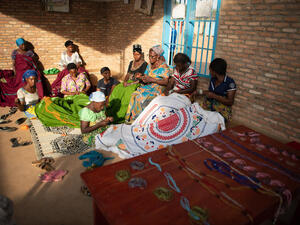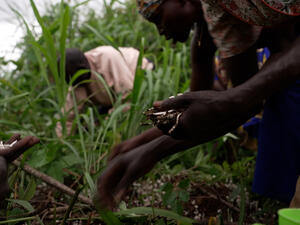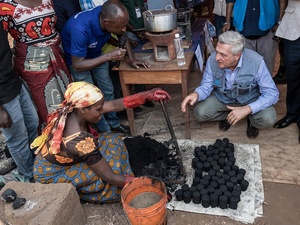After decades in Pakistan, more Afghan refugees set to return
After decades in Pakistan, more Afghan refugees set to return

Qudsia, 40, talks to UN High Commissioner for Refugees Filippo Grandi about returning to Afghanistan with her husband and four children after living 35 years in exile in Pakistan.
PESHAWAR, Pakistan, June 23 (UNHCR) – Families sat quietly. Small children explored among the chairs. These people were going back, some after decades. And they were going back for good.
They were Afghan refugees and this was the Voluntary Repatriation Centre of UNHCR, the UN Refugee Agency, in Peshawar.
Payenda Bibi Shahnaz sat in a wheelchair. Her husband Shamamud sat in another one. They have been refugees in Pakistan for 33 years but they, too, are going back to Afghanistan with their two sons, who will take care of them.
UNHCR will also help them after they return to their country.
“I simply can’t afford treatment for my illness here,” she said. “We have no other option.”
The two met with UN High Commissioner for Refugees Filippo Grandi, who visited the centre today and wished them luck. UNHCR also provides returning refugees with US$200 for initial travel and housing.
There is now a concerted push from the Pakistan government to repatriate a large number of the almost one million refugees living in the Peshawar district. UNHCR has set aside funds for 60,000 returnees.
But so far this year just over 6,000 have actually crossed the border permanently.
For many the moment they hand in their Pakistan refugee registration card is emotional. School pupils are often in tears, thinking they may not see their friends again.
What drives most is economic necessity.
Qudsia is 40 and a mother of four children. She came to Pakistan as a child. Now she and her husband have decided to go back.
“We decided to return because it’s so expensive. We have problems. My husband is diabetic and there is no work here.”
But many more choose to remain. They told Grandi at a ‘shura’, or community meeting, that educational and economic opportunities kept them in Pakistan. They also feared the violence in their home country. Of Afghanistan’s 34 provinces, 31 have seen scenes of conflict in recent months.
Another great fear is centred on their Pakistan Proof of Registration cards. These are all due to run out on June 30. Without them, refugees are subject to arrest and even deportation. Grandi said he had strongly urged the Pakistan government to extend their validity. The decision will be made by the Pakistan cabinet.
Grandi told them he understood their fears and their concerns that $200 is not enough to resettle in an uncertain country.
“I have heard the shura representatives,” he said. “We will increase the repatriation package very soon. We will work to create better conditions for returnees. I have talked about this with Afghan government leaders.”
He talked of his meeting with Afghan president Ashraf Ghani. Ghani told him he had ordered an inventory of available government land. The goal would be to set up a resettlement programme for refugees similar to a pilot scheme in Herat for internally displaced people.
Refugees, like the internally displaced in Herat, would be given plots for houses. Water and electricity would be supplied.
Grandi also addressed the refugees’ fears that they are being made scapegoats after attacks or violent incidents along the Pakistan-Afghan border.
“I have heard your message. Refugees are not terrorists. I agree with that.”
He said he had stressed to Pakistan government leaders that the whole refugee population must not be blamed or penalized for such actions.









